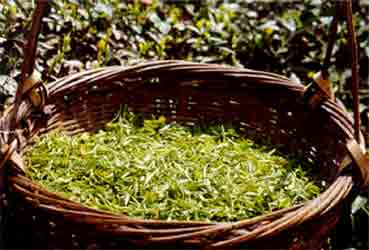
West Lake Stop Smoking Tea
Cigarettes are smoked to feel refreshed-invigorated or calmed-and it is difficult to stop smoking because of the urge to attain the mental and physical state that occurs during and right after smoking. If, instead of smoking at such times, one takes the West Lake Tea, then the desire to smoke will fade, and one will smoke less and less. Even the seeming good taste of smoking will no longer be there. Eventually, West Lake tea can be replaced by any desired green tea as a way of maintaining a sense of equilibrium rather than returning to smoking.
West Lake Stop Smoking Tea is a product of Zhejiang Province. In that province is the beautiful city of Hangzhou, famous for the West Lake. Nearby, is Tian Mu Mountain, which is well-known for its tea plants, where the delicate "cloud and fog" (yunwu) tea is grown (see the next page for more on West Lake, Tian Mu Mountain, and its tea). The tea gets this name (often shortened to just "fog tea") because of the weather conditions that are ideal for growing fine tea. This unique green tea from Tian Mu mountain is the foundation of West Lake Stop Smoking Tea.
 Smoky mountains of Hangzhou. |  Freshly harvested Tian Mu Mountain tea |
Added t0 the tea leaves is a collection of herb extracts, based on a formula that had been used more than a century ago to help wean Chinese nobility from opium addiction, a common problem during the Qing Dynasty (1644-1911). Among the main ingredients of this formula are ginseng leaves, lotus seeds, asparagus roots, and betel nuts. The complete formula remains a secret. The principles of therapy, however, are well established. The purpose of the herbal ingredients is to nourish and strengthen the internal organs so that there is a greater sense of stability and control.
The tea bags are used one bag per cup. The tea may be taken as often as needed, typically 3 times per day (one cup each time) to prevent the urge to smoke; but also any time that this urge is strong. A stop-smoking endeavor should only take a few days, not more than 10 days in most cases, which may require using about 3-4 boxes of the tea (each box contains 8 tea bags). Of course, success in this endeavor will also require a strong desire to succeed in giving up the smoking habit. See an acupuncturist about utilizing daily acupuncture and additional herbal materials to improve chances of success and speed the process of withdrawal from nicotine addiction.

West Lake and the floating tea pavillion
ABOUT HANGZHOU AND WEST LAKE
Marco Polo called Hangzhou the most enchanting city in all the world. This is most evident in the West Lake area-the effective, if not geographic, center of Hangzhou. Hills embrace the lake on three sides; the city proper lies to the east. Ancient Chinese people praised the West Lake area as a land of intoxicating beauty. Legend has it that the West Lake was a heavenly jewel fallen to earth. The West Lake is a like a shining pearl inlaid on the vast land of China, reputed for beautiful scenery, a multitude of historical sites, brilliant cultural relics, and a profusion of native products. West Lake has inspired painters and writers for centuries.
An east-west causeway links the Solitary Island to the land surrounding the lake. It is said that the famous Chinese writer Lin Bu (967-1028) lived in seclusion on this island for twenty years. Shunning the corrupt life of the officials, he dedicated himself to the cultivation of the 365 plum trees which he planted there. Mundane court life followed in his wake however, when the Qing Dynasty Emperor Qianlong (reign 1736-1795), charmed by the island's scenery, established an Imperial Palace on it. In 1911, at the fall of the Qing Dynasty and in honor of the president of the new republic, the site was opened to the public.
The Quyuan Garden on the lake's western shore was first landscaped during the Southern Song dynasty (1127-1279); it was recently enlarged into a huge park. Within it are over two hundred species of lotus-a view of these unusual flowers blooming from July to September against the serene background of the West Lake may be one of the most stunning floral spectacles to behold. Tea tables, placed in courtyards and pavilions along the lake shore, create an ideal atmosphere to survey one of the most delightfully pictureusque spots in China.
ABOUT TEA ON TIAN MU MOUNTAIN
Tian Mu Mountain, in the northern part of Zhejiang Province, near Hangzhou, has lofty twin peaks. There is a lake of crystal clear water on each peaks, hence the name "Tian Mu," meaning eyes of the sky. Tian Mu Mountain has been famous for its tea for more than a thousand years. There is a poem about the tea from this mountain by Huang Puzhen, a Tang Dynasty poet, friend of the tea sage Lu Yu, who wrote the original classic Book of Tea (Cha Jing):
Saw Lu Yu off to Pick Tea at Tian Mu Mountain
When spring tea flourishing again;
His profound knowledge about picking tea
Through morning mist or twilight clouds
That solitary journey being my envy.
Rendezvous in a temple of a remote mountain,
We enjoyed a picnic by a clear pebble fountain.
In this silent night,
Lit a candle light,
Knocked a marble bell for chime,
While deep in thought for old time.